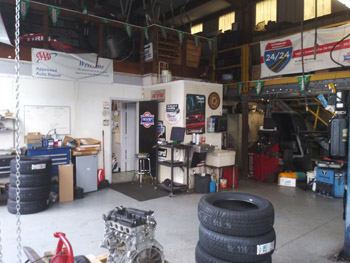All Categories
Featured
Normal engine tune-ups are important for maintaining your vehicle's efficiency, enhancing gas performance, and expanding its life expectancy. Whether you're an experienced cars and truck proprietor or a novice, recognizing the essential elements of an engine tune-up can help you keep your cars and truck running efficiently for many years. Here are some important tips to guide you with the procedure.
- Modification the Spark Plugs. Ignition system are small yet mighty components that play an essential function in firing up the fuel-air blend in your engine. In time, they can break or end up being fouled, causing bad engine performance, minimized gas performance, and difficult starts.
Throughout a tune-up, check your stimulate plugs for wear and replace them as essential. For a lot of vehicles, spark plugs ought to be replaced every 30,000 to 100,000 miles, relying on the kind and material. Fresh trigger plugs make certain effective combustion and smoother engine procedure.
- Check and Change the Air Filter. The air filter is your engine's very first line of protection against dirt, debris, and other contaminants. A clogged up or dirty air filter can restrict airflow, causing your engine to function more difficult and consume even more fuel.
Inspect your air filter during a tune-up and change it if it's dirty or past its advisable solution interval. A clean air filter improves engine effectiveness and boosts fuel economic situation.
- Inspect the Gas System. Over time, your gas system can build up dust and carbon deposits, reducing engine performance and fuel efficiency. Cleansing the fuel injectors and fuel lines during a tune-up assists maintain proper gas distribution and burning.
You can make use of a fuel system cleaner or have a professional mechanic carry out an extra extensive cleaning. This action is especially advantageous for older automobiles or vehicles frequently driven in stop-and-go web traffic.
- Evaluate the Belts and Hose pipes. Belts and hose pipes are essential for different engine features, such as running the alternator, water pump, and cooling. During a tune-up, check for cracks, fraying, or indicators of endure these components.
Change any kind of damaged belts and tubes to avoid potential failures. A busted belt or leaking hose can cause engine getting too hot or loss of power, so resolving these problems quickly is essential.
- Change the Engine Oil and Oil Filter. Engine oil is crucial for lubricating moving components, reducing rubbing, and controling engine temperature level. Gradually, oil comes to be infected and loses its performance.
As part of a tune-up, replace the engine oil and oil filter. Make use of the sort of oil suggested by your automobile's manufacturer and stick to the suggested modification periods. Tidy oil keeps your engine running efficiently and avoids premature wear.
- Check the Battery and Charging System. A healthy battery is crucial for beginning your vehicle and powering its electrical systems. During a tune-up, inspect the battery's voltage and examine the terminals for rust. Tidy the terminals if required and guarantee a safe and secure connection.
In addition, test the generator and billing system to guarantee your battery continues to be charged during procedure. If your battery is weak or old, consider replacing it to stay clear of unforeseen breakdowns.
- Flush and Replenish the Coolant. The cooling system regulates your engine's temperature, avoiding it from overheating. Old or polluted coolant can lose its efficiency, causing possible engine damages.
Throughout a tune-up, flush the old coolant and replace it with a fresh combination. Additionally, evaluate the radiator, thermostat, and hoses for leaks or damages. Maintaining the air conditioning system in great condition ensures your engine runs at the best temperature.

- Address Warning Lights and Unusual Signs And Symptoms. Modern vehicles are furnished with diagnostic systems that signal you to potential concerns through control panel warning lights. If your check engine light or any various other warning indicators are on, resolve them throughout your tune-up.
In addition, take notice of uncommon signs and symptoms such as odd noises, harsh idling, or reduced fuel performance. A specialist auto mechanic can diagnose and settle these troubles throughout the tune-up procedure.
- Don't Neglect the Exhaust System. Your car's exhaust system eliminates harmful gases from the engine and guarantees correct emissions. Evaluate the exhaust system for leakages, corrosion, or damages during a tune-up. A faulty exhaust system can affect engine performance and cause environmental and security issues.
- Use High-Quality Parts and Fluids. When replacing components or completing fluids throughout a tune-up, always choose premium products that fulfill your lorry's specs. Making use of below average parts or wrong fluids can adversely influence your engine's efficiency and durability.
Conclusion: Regular Tune-Ups Are Key to Engine Health. Making the effort to tune up your engine ensures it operates successfully, conserves gas, and minimizes the danger of break downs. Whether you execute these tasks yourself or depend on a trusted mechanic, regular tune-ups are an investment in your lorry's integrity and long life. Follow these suggestions, and you'll enjoy a smoother, more reliable trip for many years to come.
Latest Posts
Explore Limited-Time Auto Repair Specials in Chicago at Montclare Auto Repair
Learn About Montclare Auto Repair’s Most Popular Services and Why Drivers Trust Them
Enhance Your Residential Property with Expenses Door Equipment
More
Latest Posts
Explore Limited-Time Auto Repair Specials in Chicago at Montclare Auto Repair
Learn About Montclare Auto Repair’s Most Popular Services and Why Drivers Trust Them
Enhance Your Residential Property with Expenses Door Equipment
